52 citations,
April 2008 in “Therapeutics and clinical risk management” The birth control combination of ethinylestradiol and drospirenone helps treat symptoms of polycystic ovary syndrome.
[object Object]  14 citations,
October 2019 in “International Journal of Women's Health”
14 citations,
October 2019 in “International Journal of Women's Health” Menopausal acne is treated with medications and lifestyle changes, but careful choice is needed due to side effects.
 10 citations,
January 2019 in “Archives of Endocrinology and Metabolism”
10 citations,
January 2019 in “Archives of Endocrinology and Metabolism” Testosterone therapy may slightly increase sexual desire in women with HSDD but lacks broad recommendation due to safety concerns and limited approval.
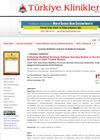 2 citations,
January 2013 in “Türkiye klinikleri tıp bilimleri dergisi”
2 citations,
January 2013 in “Türkiye klinikleri tıp bilimleri dergisi” The study suggests using a score of 11 on the mFG scale to diagnose hirsutism in Turkish women, with adjustments for age, skin type, and family history.
 1 citations,
July 2023 in “Frontiers in Immunology”
1 citations,
July 2023 in “Frontiers in Immunology” Oxidative stress and immune dysfunction are linked to both Hashimoto's thyroiditis and polycystic ovary syndrome, with diet and specific treatments important for managing these conditions.
 1 citations,
April 2018 in “Revista da Sociedade Portuguesa de Dermatologia e Venereologia”
1 citations,
April 2018 in “Revista da Sociedade Portuguesa de Dermatologia e Venereologia” Hidradenitis suppurativa is a chronic skin condition more common in women, linked to genetics and lifestyle factors, and associated with various other health issues.
 January 2019 in “Obstetrics & Gynecology International Journal”
January 2019 in “Obstetrics & Gynecology International Journal” Hormonal changes and conditions like polycystic ovarian syndrome are major causes of adult acne in women, with varying prevalence among different ethnicities.
 January 2022 in “IntechOpen eBooks”
January 2022 in “IntechOpen eBooks” Some lesser-known causes of PCOS include autoimmune issues, genetic mutations, and changes in the body's microbiome.
January 2022 in “Dubai diabetes and endocrinology journal/Dubai diabetes & endocrinology journal” A 16-year-old girl with HAIR-AN syndrome was treated with lifestyle changes and medications to manage her condition.
January 1990 in “Journal of dermatological treatment” Clinical features of hyperandrogenism do not predict the success of conventional acne treatment in women.
16 citations,
February 2014 in “Iranian Red Crescent Medical Journal” Polycystic Ovary Syndrome (PCOS) affects Iranian women's feelings of femininity and self-image.
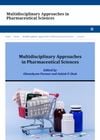
Herbal remedies like liquorice and aloe vera may help manage PCOS symptoms.

Hair loss in women with PCOS is linked to high androgen levels but the relationship is unclear.
 October 2023 in “Clinical case reports”
October 2023 in “Clinical case reports” A woman's male-pattern facial hair growth was caused by a rare malignant ovarian tumor that was difficult to diagnose and treat.
[object Object] 514 citations,
February 2011 in “International journal of women's health” Different treatments for PCOS focus on the specific symptoms, with weight loss and lifestyle changes being important.
 2 citations,
February 2023 in “BMC women's health”
2 citations,
February 2023 in “BMC women's health” Birth control pills change the activity of certain inflammation and blood clotting genes in women with PCOS.
 1 citations,
January 2023 in “Deleted Journal”
1 citations,
January 2023 in “Deleted Journal” PCOS negatively affects women's quality of life, especially if not detected early.

There are many ways to treat Polycystic Ovary Syndrome, including lifestyle changes, surgery, and various medications, but more research is needed for better treatments.
September 2020 in “Himalayan Journal of Health Sciences” Papaya leaves have many health benefits and medicinal uses.
Different medications improved various PCOS symptoms and quality of life in Pakistani women, but did not significantly help with excessive hair growth.
 August 2018 in “Ayurlog: national journal of research in ayurveda science”
August 2018 in “Ayurlog: national journal of research in ayurveda science” Polycystic Ovarian Syndrome (PCOS) can be effectively treated with Ayurvedic dietary management.
April 2018 in “International journal of innovative research in medical science” Neem and Zanjabeel are as effective as standard drugs for treating hirsutism in PCOD patients.
March 2018 in “Chin J Reprod Contracep” Chlormadinone acetate is useful for birth control and treating various hormonal issues.
 October 2016 in “Journal of the Dermatology Nurses’ Association”
October 2016 in “Journal of the Dermatology Nurses’ Association” Polycystic Ovary Syndrome (PCOS) affects 6%-15% of women of reproductive age, causing symptoms like acne and hair loss, and increasing the risk of type 2 diabetes and heart disease; it's managed through diet, exercise, and medications like Metformin and hormonal contraceptives.
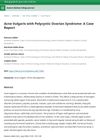 December 2024 in “Eastern Medical College Journal”
December 2024 in “Eastern Medical College Journal” Acne and PCOS are linked due to hormonal imbalances and metabolic issues.
 September 2024 in “Advanced Biomedical Research”
September 2024 in “Advanced Biomedical Research” Auriculotherapy and Aslagh capsules are as effective as metformin for treating PCOS symptoms, with auriculotherapy slightly better for reducing hair growth.
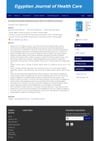 October 2022 in “Egyptian Journal of Health Care”
October 2022 in “Egyptian Journal of Health Care” Female nursing students with iron deficiency anemia have poor knowledge and practices regarding iron intake, needing better health education and physical monitoring.
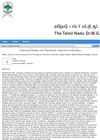
The study concluded that hirsutism is most common in women aged 14 to 48, often caused by PCOS, and can be effectively treated with Nd YAG laser and IPL.
January 2020 in “Menoufia Medical Journal” IGF-1R may play a role in female hair loss and could be a treatment target.
21 citations,
November 2017 in “Cochrane library” Ovarian drilling surgery is not clearly better than medical treatments for PCOS symptoms.


















